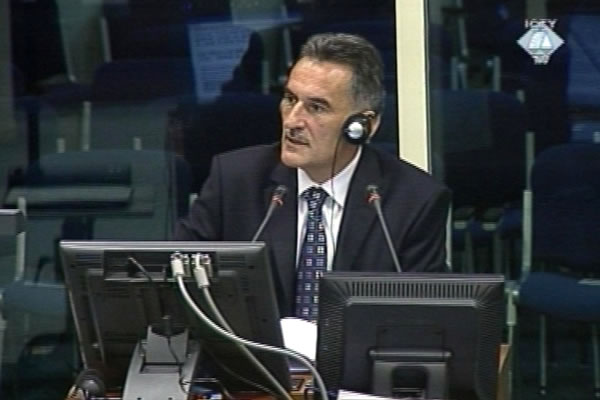Home
WHO BOUGHT DOCUMENTS ON THE BLACK MARKET?
The defense counsel representing the Croatian generals have distanced themselves from the claims made by Pero Kovacevic, Cermak’s expert witness. Kovacevic has said that the accused Croats have had to ‘buy’ documents they need for their defense case ‘on the black market’
 Pero Kovačević, svjedok odbrane Ivana Čermaka
Pero Kovačević, svjedok odbrane Ivana Čermaka General Ivan Cermak’s defense case continued today with the testimony of legal expert Pero Kovacevic, whose expert report was admitted into evidence. There was no examination-in-chief and the public was left in the dark as to the contents of the report. The brief cross-examination by Ante Gotovina’s defense indicated that the report, or parts of it, contains a legal analysis of the place the military police had in the HV system.
In response to Misetic’s questions, the witness said that Croatia opted for the German model, whereby the military police is not part of the armed forces, but is under the jurisdiction of the defense ministry. This was done in order to prevent the HV commanders, including Gotovina and Cermak, from influencing the course of the investigations into any crimes their troops may have committed, since the investigations were under the jurisdiction of the military police. The defense case of the two military generals in the dock is that they had nothing to do with the military police and were thus unable to prevent the crimes against Serbs during and after Operation Storm in August 1995. Police general Mladen Markac is also charged with the same crimes.
Prosecutor Russo began the cross-examination by showing the witness a part of his expert report where Kovacevic sets as his goal ‘an objective and neutral’ presentation of his conclusions. The prosecutor contends that the witness’s earlier statements and articles published in the Croatian press show he is ‘neither neutral nor objective’. He showed Kovacevic an article from 1997 where Kovacevic says that the indictment against the Croatian generals ‘is aimed against the Croatian state’; the government has to take steps to bring down ‘the monstrous document’.
When the prosecutor put it to the witness that the goal of his expert report was precisely to bring down the indictment, and not to provide ‘a neutral and objective’ legal analysis, the witness replied that in the article he had spoken as a politician and a member of the Croatian Parliament from the Croatian Party of Rights (HSP), and that it had nothing to do with his expert findings. He noted that he had left the HSP last year because of ‘violations of democratic procedure’ in party bodies.
In the article, Kovacevic demanded that the Croatian authorities assist with the defense of the Croats in the Tribunal’s dock, saying their defense teams had been forced to ‘buy documents on the black market’. Kovacevic claims he has heard only about General Slobodan Praljak buying documents for his defense on the black market, but the defense teams of all three accused played it safe and distanced themselves from the claims, saying they have never bought any documents on the black market.
The prosecutor then showed the witness an article from 2007, in which Kovacevic, on behalf of the HSP, calls for a referendum to put a stop to Croatia’s cooperation with the Tribunal because of mild sentences the Trial Chamber imposed on the Vukovar Three. The witness explained that this was the position of the party and that he was speaking as its mouthpiece. He urged the prosecutor and the judges again not to mix up his political views and his expert opinions. ‘If your baker presents political views you don’t like, you’re not going to say his bread was no good,’ Kovacevic said to illustrate the point.
In the second part of the hearing today, the prosecution will, as indicated, deal with Kovacevic’s expert opinions, i.e., the conclusions he reached in his analysis about the place of the military police in the Croatian Army system.
Linked Reports
- Case : Gotovina et al. - "Operation Storm"
- 2009-09-24 GENERAL CERMAK’S ‘INFORMATIVE ORDERS’
- 2009-09-22 CERMAK’S DEFENSE CASE BEGINS
- 2009-09-16 WITNESS: CROATIA SACRIFICED ‘SELECTED CROATS’
- 2009-09-28 CIVIL COMMANDER IN A MILITARY UNIFORM
- 2009-09-29 IVAN CERMAK WAS ‘A MULTIDIMENSIONAL PERSON’
- 2009-09-30 INEFFECTIVE ORDERS TO IMPROVE EFFECTIVENESS
